Adaptation: Stealing, Borrowing, and How Else Adapting Science Fiction Could Work in the Future
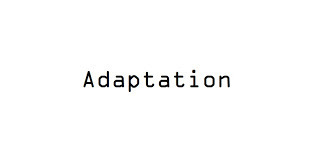
Adaptation: Stealing, Borrowing, and How Else Adapting Science Fiction Could Work in the Future.
As a fan of science fiction in all mediums, it's easy to spot influences and references in videogames. When playing through a FPS from the late 90s era, you'll hear many, many Evil Dead 2 quotes, namely in Duke Nukem 3D and Monolith's Blood. Aliens has been ripped off every way possible, from rather blatant homages to boosted design elements. Which, oddly enough, Aliens borrowed heavily from Heinlein's Starship Troopers, so there's that. But on the topic of direct adaptations of a sci-fi novels to videogames, there's hardly any.
Granted, sci-fi novels get made into movies quite regularly. A lot of the time, as in Philip K. Dick's case, the film versions drop a lot of the meditative elements of Dick's work in favor for car chases, foot chases, and shoot outs. (Seriously, look at Minority Report and The Adjustment Bureau.) The exception--and there always is one--is A Scanner Darkly, one of the few adaptations of one of my personal hero's work that sticks close to its source material. And I don't really mind those other, action-laden adaptations really, because it still gets people to pick up the book in most cases. Every time one of his books becomes a movie, the book gets a resurgence in sales. So if it gets people to read, any port in the storm I say.
And that makes me wonder, if they're going to go ahead and action-up sci-fi novels that didn't originally have a lot of action to them, why not just do a videogame adaptation? For one, a film is generally an hour and a half, two hours in length. With a game, there's so much more time to develop characters and get more of the book across. Plus, with a complete world already to go in a novel, that'll cut down on coming up with the spine of the story. It's already there, just tweak it to fit and boom, add some fancy graphics and sound effects and full speed ahead, captain.
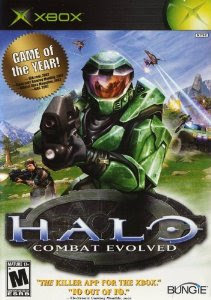
And there are a lot of close adaptations, to the point that I think some game development studios should be putting authors' names in their special thanks in the credits crawl. Give the description of Larry Niven's Ringworld series and most people will say, "That sounds a lot like Halo." [Note: A few of Niven's works have been adapted into games, but I never heard of any of them until researching this essay. DOS-era point and click adventures, it seems to be. What's funnier is if you search for Larry Nevin on Amazon, you might get an ad for Halo 4 like I did. Coincidence?] Halo, as a whole, is a rather enormous stockpile of borrowed ideas taken from a myriad of space opera novels, the film Aliens, and countless other works. Also, Bungie's newest project, Destiny, if you read the description, sounds a whole hell of a lot like Arthur C. Clarke's Childhood's End. Now, don't get me wrong. I loved Halo: Combat Evolved and me and my group of gamer friends are currently salivating at every scrap of news that's being released about Destiny. But I think giving credit where credit is due is important. For some reason, though, games seem to get away with this a lot. If a movie were to be released with Destiny's plotline, I'm sure the estate of the late, great Sir Arthur C. Clarke would be placing some calls.
Oddly enough, the Halo franchise has gone on to have a series of novels set in their world. I've read the first one, The Fall of Reach, and actually really enjoyed it. I've also heard that there are some people who aren't even gamers who read this series. Makes sense, for as much as Halo is kind of the "Grease Mega Mix" of the genre, its world is really well fleshed-out and intriguing.

Speaking on direct references, the protagonist of the Dead Space series is a CEC engineer named Isaac Clarke. Any sci-fi reader who has gone back a few decades can tell you that name is a mash-up of Isaac Asimov and the aforementioned Arthur C. Clarke. This is one reference I really get a kick out of, especially when I get to be the nerd who unleashes that golden nugget of trivia on someone. While on the topic of Dead Space, let's just say that, like Halo, it too is another mega mix of the sci-fi genre except here incorporating one of my much-loved subgenres, sci-fi horror. Everything from Alien to Event Horizon is present in Dead Space. Although the world is less appealing than that of Halo and at times feels sort of tacked-on, the atmosphere is what really counts with this series and where it borrows, it borrows smartly.
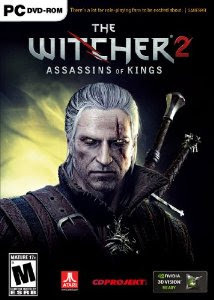
But, there are a few exceptions. Because, as I said before, there always are. One being the Andrezj Sapkowski series of fantasy novels about Geralt, the Witcher. Which, if you're a gamer at all, have probably heard of the Witcher more than a few times, even if just for the lighthearted controversy surrounding the fact that one of the game's main characters was featured in a Playboy spread. (Yes, that's right, a centerfold of a woman made up entirely of polygons.) I really enjoyed the two Witcher novels that've been translated to English. They're mature, weird, violent, all the things grown-up fantasy worlds should be. I've never played any of the games, and again, if it gets the books in front of people's eyes (and for them to get translated so I can read them), I'm all for it.
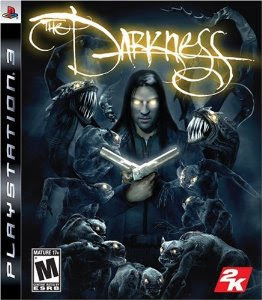
Another title worth mentioning is The Darkness. Although not a novel, but a graphic novel, The Darkness was a phenomenal adaptation. I'd never heard of the comic series before the game, but certainly picked it up afterward. Starbreeze, who recently released Syndicate (with novelist Richard K. Morgan supplying some writing), did this one. Most known for their Chronicles of Riddick: Escape from Butcher Bay from a few years back, The Darkness was atmospheric, built upon the world, and really delivered a visceral, beautifully crafted world.
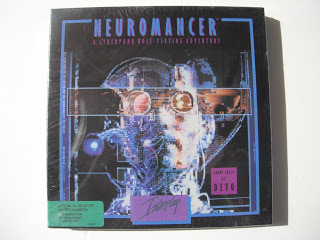
There are other direct adaptations worth mentioning, such as I Have No Mouth and I Must Scream DOS game based on Harlan Ellison's work of the same name. As well as the mostly-forgotten Neuromancer DOS game as well. The latter of which, I believe, would make a truly fantastic RPG today. That is, if Deus Ex: Human Revolution hadn't already done exactly that. But, one could argue that Deus Ex, as a series, is less about deriving inspiration from particular works but more like setting their world in a cyberpunk landscape; an homage to the subgenre as a whole. Which I'm totally okay with because my love of all things cyberpunk goes that deep. (And just wait, because apparently in the near future we're going to be having a Deus Ex film and a Neuromancer film, possibly in the same year. Weird.) Another direct adaptation apparently releasing in the next year or so is a MMO based on Tad Williams' Otherland series. Word has been pretty quiet about this one recently, which makes me wonder if it didn't get cancelled. Hope not. The trailer was pretty.
Which brings me to the main attraction when talking about videogames borrowing from popular science fiction works. Mass Effect. Now, I won't go into huge detail about what and how BioWare borrowed, but suffice it to say if you pick up Dan Simmons' Hyperion, then play Mass Effect, I think you'll be dubiously cocking an eyebrow pretty damn often, namely around the A plot.
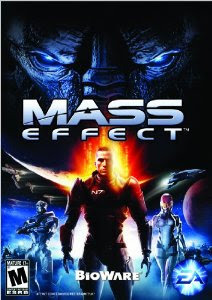
But, I think the game gets a pass because what is truly its own is so good. The alien races, the insane amount of lore about everything, and the characters are so original and (mostly) immediately lovable. This being another game series, like Halo and Dead Space and Metal Gear Solid, that has branched out into the world of tie-in literature. And let me tell you, Mass Effect fans are serious. I think one of novel, if I remember right, got so blasted by the online communities for the author getting things wrong, it got pulled, reworked, and then rereleased. Wow!
And while coming up with the world is often the hard part, what's harder is finding a good A to B plot that'll both be a personal story as well as one that dovetails nicely into the world you've crafted. Which I think is where a lot of videogame writers struggle. Case in point the original Borderlands. Great look, great world, great humor, but the story was all but absent. Thankfully they made up for it in the second one, but it seems almost to the point they over-corrected by putting in too much story because of a bellyaching fanbase. Which is a topic for another time, like I hinted above about the reworking Mass Effect novel, how the Internet gave a voice to everyone. Something that's both good and bad for creative types.
So, I think while it's healthy to borrow (Tarantino's cultivated a career out of it), and it's healthy to drop hints and homages and easter eggs in your work, I would really like to see the videogame industry--as the graphical power is increasing to the point that movie CGI characters and videogame characters are hard to tell apart--that the games industry begin to treat source material not as a place to skim from, but a place to acquire and adapt straight-out. Plus, by going straight from book to movie we can avoid the awfulness that generally occurs with movie adaptations of books that get a game. Those are universally bad. Or worse, the reverse: videogame movie novelizations. Yikes.
Let's just cut out the middle man and adapt in a straight line. Videogames pull in more than any other entertainment industry combined. And people are constantly saying how the stories of games aren't quite there yet, not enough to be considered art. Literature is one of the oldest art forms there is. Why not bind the two up? And really, if given the option, I'd much rather tromp around Hyperion and explore the Time Tombs than watch it as a movie anyway. Mind you I didn't say I'd rather do it more than read the book, that comes first, but anything after that, yes, a sitting-forward experience is so much more fulfilling I think nowadays than a sitting back one. Movies blow now. Fact. Reboots, rehashes, remakes. No. Let's somehow arrange it that Heavy Rain's David Cage and Neal Stephenson get together with a handful of coders, motion capture-ready actors, and a copy of Cryptonomicon. Just imagine that.
I stand by all I stated above and believe it should happen, except for epic poems. Let's not do any more of those, okay? Dante's Inferno was just . . . no.
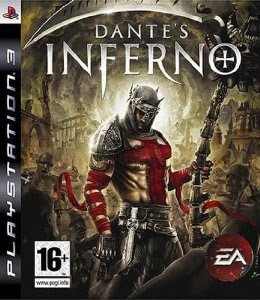
Published on February 28, 2013 09:34
No comments have been added yet.



